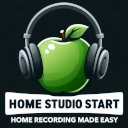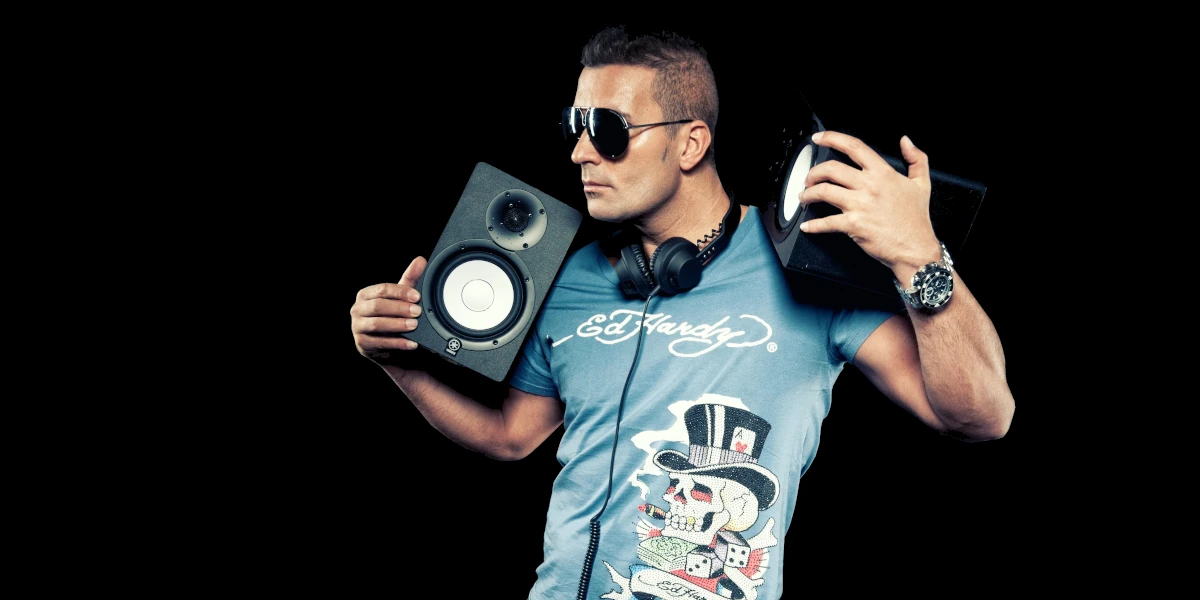Has the rhythmic call to create and mix beats been tapping on your shoulders? Could a DJ Home Studio be the magic booth that rockets your music career sky-high? Imagine harnessing the power of a professional studio right within your cozy abode. Now, transform that mental beat into a thumping reality!
Whether you’re plotting to stir the SoundCloud scene, shake up Spotify, or craft the next viral remix, a personal recording studio is your launchpad to stardom. With talented artists worldwide stepping out of anonymity, it’s your turn to spin the decks of destiny. In this post, we’ll uncover the essential steps to piece together your own DJ Home Studio — a veritable laboratory for your audio experiments.
As you read on, picture your fingers flying across the mixer, the headphones snugly encircling your ears, and the pulsating glow of the monitor as you weave your next auditory masterpiece. Excited? You should be! We’re here to guide you through crafting your first mashups, remixes, and reedits, and set you on a path to become the maestro of your own music domain.
So, let’s not hit pause on your dreams! Slide the fader up on your enthusiasm and prep your playlist of ambitions. We’re about to drop the bass on the opening chapter of your DJ Home Studio journey. Are you ready to turn up the volume on your passion and play your life in a major key? Let’s get this party started!
The Heartbeat of Your Studio: Choosing the Right Hardware
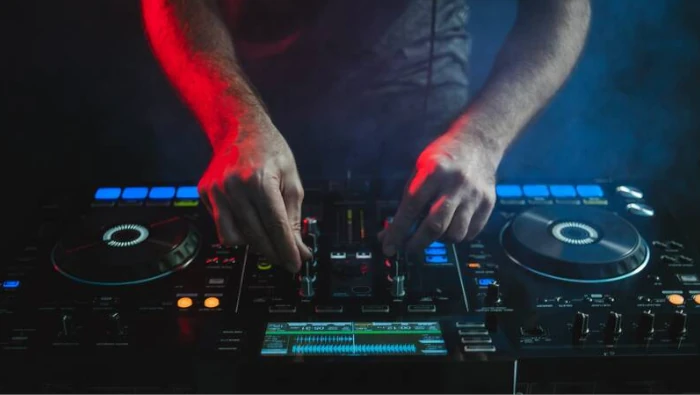
Hey there, future DJ superstars! Are you ready to jive into the techy heart of your soon-to-be-thriving DJ Home Studio? Let’s talk hardware. Because, believe it or not, your music-making magic starts with a powerful beast of a machine that can handle your hottest tracks without breaking a sweat.
First things first, the computer is your studio’s command center. In the last few years, technology has strummed up some serious changes, letting us produce music at the click or tap of a button. Yet, not all computers are created equal — and you definitely don’t want tech tantrums ruining your creative flow.
“Hold on,” you might say, “but aren’t computers these days powerful enough?” Well, the short answer is yes, almost. However, cheaper PCs can sometimes wobble like a wonky turntable, which is the last thing you need when you’re knee-deep in beats. Plus, nobody wants their studio sessions interrupted by overheating-induced crashes or the dreaded ‘unsaved project’ horror story.
If you’re leaning towards a desktop – and kudos for that – rolling up your sleeves and assembling it yourself might just be your golden ticket. This way, you’re in control, piecing together a digital jigsaw that’ll stand the test of time (and the next ten years of DJ-ing brilliance). Sure, it sounds hefty on the wallet and mind-boggling in techy terms, but embracing the challenge is how we smash through barriers and tune into success!
Now, what if DIY isn’t your jam? No stress. Aim for a desktop that’s mid-range in price – that’s roughly 50% pricier than the bargain bin special. It may not sound cheap, but think of it as investing in non-stop, worry-free studio sessions.
A DJ Laptop
Lean closer, laptop lovers; we’ve got a chat about laptops. Although they masquerade as do-it-all devices, they can trip over their own laces when pushed to the edge in a high-demand studio environment. And if you don’t live in an igloo, overheating could have you cursing more than a dropped beat.
So, if you’re team laptop, prioritize one with stellar cooling capabilities to keep those sessions sizzling — in a good way.
Alright, we’ve covered the gear that’ll take the heat, but remember, a DJ needs an audio interface too. I’m winking at you, minimal latency lovers, because real-time software is the backbone of our craft. For the record, the M-Audio Fast Track Pro is a crowd favorite for those starting to mix things up.
To sum it up, finding the right hardware might feel like a balancing act on the wheels of steel, but it sets the foundation of your entire DJ Home Studio. Consider it your first big drop in this epic track you’re about to release! Now, go ahead and make some noise with your gear choices!
Spinning the Right Software: The DJ’s Tool Belt
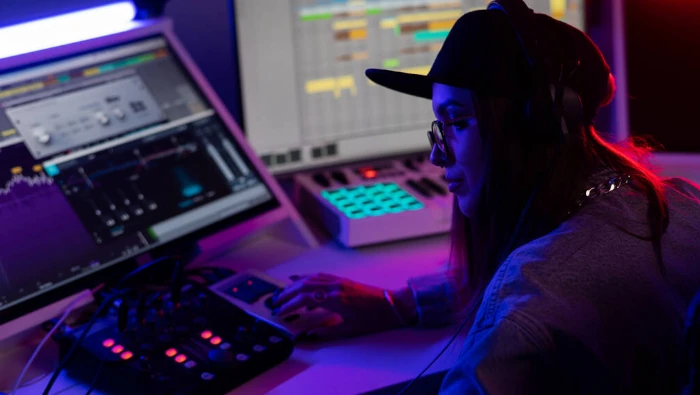
Hey there, future masters of the mix! When you’re assembling your DJ Home Studio, the right software isn’t just nice to have, it’s your bread and butter. This is the digital landscape where your creativity will soar and your beats will come to life, so let’s get into it, shall we?
Navigating the realm of music software can feel like you’re a kid in a candy store – there’s so much to choose from! But as with most things, familiarity breeds comfort. You might already be jamming with some software, enjoying the feel of its virtual knobs and sliders. However, just like an orchestra conductor doesn’t wield just one baton, a DJ should be versatile with their tools.
Ableton Live, my friends, is the Jedi lightsaber of DJ software. Whether you’re chopping, screwing, or blending tracks, it adapts to every aspect of your creative flow. Want to whip up some crunchy mashups? Ableton Live is your go-to guru, making light work of even the most complicated audio puzzles.
Virtual DJ Can Make Magic
Now, for those live performance vibes, Virtual DJ steps into the spotlight. It’s like having a set of decks and a mixer right at your fingertips, with extra goodies to spice up your set on the fly. It’s no wonder Virtual DJ feels like a trusted sidekick for many DJs spinning into the night.
We can’t chat software without giving a shoutout to the sonic sculptors of the software world – VST plugins. They’re the aces up your sleeve, taking your sound from neat to next level. Picture these five essential VST plugins as the Spice Girls of your studio setup: each one brings its own flavor to the mix. A Compressor keeps your dynamics in check, a Maximizer gifts you that full-bodied sound, a Reverb for those spatial illusions, a Delay for echoes that dance, and a Stereo Expander to throw your sound across the room.
Let’s not forget about the editing maestros: Audacity, the open-source wizard that waves its wand without pulling on your wallet strings, and Sound Forge Pro, for when you need that extra shimmer on your production.
Get the most out of the software
Remember, a DJ Home Studio thrives on the back of its software. So while sticking to what you know feels safe, stepping out of your comfort zone is where the magic happens. Mastering at least five tools unleashes your full potential, keeping you ready for any beat battle that comes your way.
To all my beat droppers and melody weavers, this is your moment! Get comfortable with your software, because it’s the soil where your musical seeds will sprout. Set aside time each day to play, experiment, and tinker. Your ingenuity deserves the best tools, and your audience deserves the incredible sounds you’ll create.
Let’s turn the volume up on our dreaming, and transition our talents into tracks that’ll have the world dancing. Keep your software game strong, and your beats will thank you.
Getting the Sound Just Right: Key Audio Interfaces

✅ Check Price on Amazon
As an Amazon Associate I earn from qualifying purchases.
If you envision your DJ Home Studio as a living, breathing thing, think of the audio interface as its heartbeat; crucial for pumping the energetic beats and harmonious sound throughout your creative body of work. Enthusiasts often underestimate the significance of a high-quality audio interface, but I’m here to tell you—this is where magic happens. With minimal latency, an audio interface can make the difference between a track that feels off-beat and one that has the power to get an entire crowd on their feet.
For those starting on this sonic adventure, I highly recommend the M-Audio M-Track Solo. It’s a staple for beginners for a reason: affordability meets functionality. This audio interface provides a smooth experience, allowing you to mix and master your tracks with precision. Its user-friendly features won’t leave you scratching your head, and that means more time to get those beats rolling.
Now, let’s talk budget. While the desire to opt for the most wallet-friendly option is strong, remember that the audio interface is an investment in your sound—your signature as a DJ. Cutting corners here might save you some money upfront, but could cost you in sound quality down the line. Aim for that sweet spot: not necessarily the priciest tag but the one that gets you the best audio experience for your buck.
Choose a good audio interface
In this quest for crystal-clear sound, don’t forget to consider an interface that grooves well with your chosen software, too. Stick with an interface that has solid driver support and is known for its reliability—trust me, there’s nothing more frustrating than a technical hiccup in the middle of a creative explosion.
What about those who’ve dreamed up a home studio that pulls double duty—both as a sanctuary for production and a launchpad for live performances? We’re living in a world where versatility is key. Choose an audio interface that can handle both scenarios like a pro. After all, the ability to transition smoothly from studio to stage is what often sets apart the amateurs from the headliners.
And there you have it, future mix masters—a rundown on the importance of choosing the right audio interface for your DJ Home Studio. It’s not just the lifeline of your setup; it’s the difference between good sound and great sound, between just playing music and truly performing it. Test out a few, get a feel for what complements your style, and dive into the world of sound that awaits. Your ears—and your audience—will thank you for it.
A Process That Strikes a Chord: Your Music Production Guide
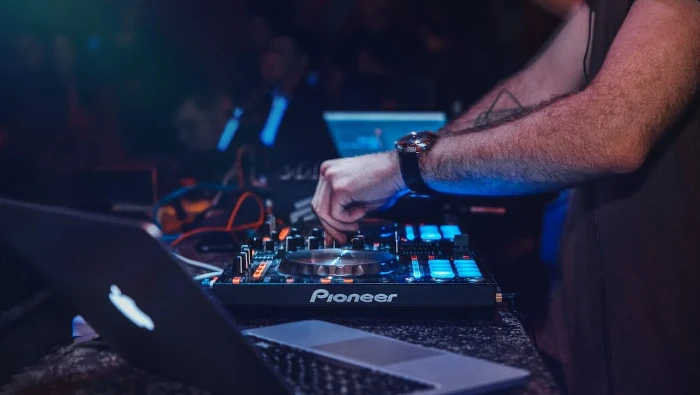
As you inch closer to materializing your dream DJ home studio, it’s crucial to acknowledge that it’s not just about having cutting-edge gadgets or high-end software – it’s also about having a sound production process that resonates with your creative spirit. Think of your studio as an orchestra, and you’re the conductor ensuring every element works in harmony.
Understanding Your Audio Tools
Your music production process begins with familiarizing yourself with the role each tool plays in creating your unique sound. Whether it’s your DAW (Digital Audio Workstation), plugins, or audio interface – imagine them as individual musicians with their strengths. You’re the maestro, blending these individual strengths into a symphony of tracks that will define your signature style.
The Symphony of Skills
What truly transforms a standard DJ home studio into a professional production powerhouse? It’s the human touch – your skills, talent, and most importantly, your understanding of sound. In this industry, DJs with the ability to sculpt audio deftly stand out. Dive deep into the nuances of EQs, gain an intuitive understanding of mix-downs, and let your creativity orchestrate the perfect beat.
Educating the Ears
Audio production is as much science as it is art. By enriching your knowledge base – whether through online courses, tutorials, or mentorship – you’ll fine-tune your ear. Every new piece of knowledge is like adding another instrument to your collection, elevating the quality of music you can produce. Don’t just play music; feel it, understand its waveform dynamics, and let it guide you to mixing masterpieces.
Harmonizing With Technology
Remember, technology is constantly evolving. So, your education in music production should be an ongoing journey. Staying updated with the latest trends and software updates will ensure that your DJ home studio remains current and competitive. Keep your ears open for advancements, and don’t hesitate to adapt your process to incorporate new techniques and tools.
A Sneak Peek Into Our Upcoming Course
Exciting news, my fellow DJs and producers! We are crafting an exclusive Home Studio Course that’s coming soon. Imagine a space where we delve deep into the intricacies of audio physics, where we explore every knob, button, and slider’s purpose and potential. This course will be your roadmap to navigating the beautiful complexity of music production, arming you with the knowledge to leverage your tools most effectively.
Crafting Soundscapes
As you prepare to embark on this production journey, visualize yourself painting with sounds, layering beats, and carving out melodies to craft an audio landscape that’s uniquely yours. In the realm of music production, every skill learned and piece of knowledge gained is another note in your composition, another beat in your rhythm, pushing you towards excellence.
In the spirit of music and mastery, keep perfecting your process, refining your skills, and expanding your knowledge. The journey to a symphony of success in your DJ home studio is an ongoing composition. Your audience awaits the magic you’ll create next – let’s make it epic!
Final Thoughts: Knowledge is Power!
And there we have it, my fellow music maestros — the crescendo of our journey into the wondrous world of DJ home studios. Remember, the turntables and mixers are merely instruments; it’s your knowledge and creativity that are the true headliners of this show. The wisdom you gather and the skills you hone will act as your personal roadies, setting the stage for your DJ dreams to take the spotlight.
As you venture forward, keep in mind that knowledge is like an exclusive VIP pass; it grants you access to new realms of possibilities. By diving into the depths of audio work, mastering the tools of the trade, and staying attuned to the latest tech beats, your power to craft those hard-hitting tracks only amplifies.
I urge you to crank up the volume on your curiosity. Stay in the mix with the ever-evolving DJ scene, explore new methods, and crossfade your way through challenges. With each new skill, your repertoire expands and so does your capacity to whip up auditory ecstasy that can captivate the crowds.
Keep growing infinitely
Don’t forget, learning is a continuous set; there’s no final track. Whether it’s through our upcoming Home Studio Course or your own ventures in sound experiments, keep the rhythm of your education flowing. Nurture those neurons with fresh info, and watch as your expertise grows, establishing you as the DJ who not only knows their beats but also knows their craft, inside and out.
So, aspiring studio sovereigns, as you adjust the levels and tweak the EQ on your own DJ home studio dreams, keep pushing the boundaries. Expand your knowledge, for it is your superpower — it’s what transforms dreams into reality, what turns the play button on for your future hits, and ultimately, what electrifies your path to success.
Keep the records spinning, your spirits soaring, and may your studio be forever sound. Until next time, my friends, mix on and prosper!
Remember, in the world of music, you’re only one beat away from your next big breakthrough.
Ready to remix your reality with more awesome insights and tips? Drop a comment, share your thoughts, and let’s keep this conversation spinning! Don’t miss a beat — hit that subscribe button and tune into the rhythms of success with every post. Rock on!
